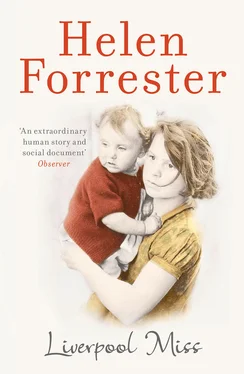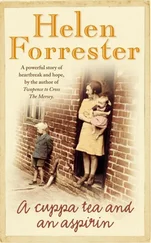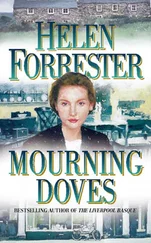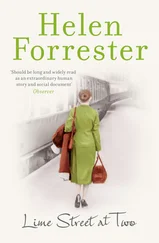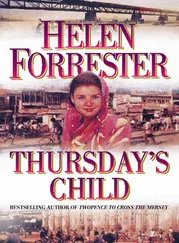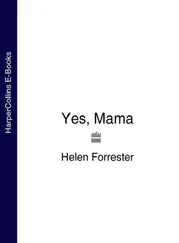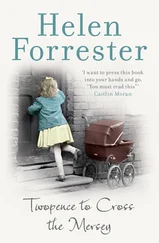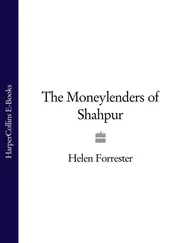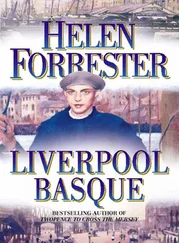When I came back she was still standing where I had left her, and I hastily tucked Edward up before I turned again to face her. My hysterical outburst had spent itself and I felt exhausted and ashamed.
‘I’m sorry,’ I said, ‘I should not have bothered you with all this. And I’m sorry it is not very clean – but I have nothing but a broom and cold water with which to clean – it’s just impossible.’
She seemed wrapped in thought, almost as if she had not heard me. Then she smiled at me very sweetly. ‘I’m glad you did show me,’ she said reassuringly. ‘I can understand better the struggle you are having. Don’t be discouraged – things have a way of getting better.’
I tried to smile back. I did not believe her.
‘I’ll come again this evening to see your mother,’ she continued, a briskness in her voice.
As I let her out of the house, she turned again to me. ‘Now remember. No getting discouraged.’
I nodded, then she smiled and went out into the rain; her coif was wet before I had closed the door.
She came, as promised, and then again and again. She was a deaconess, and mother seemed to like her because she was a gentle, cultivated woman. First Brian and, later, Tony joined the choir, their white surplices saving them from the embarrassment of their shabby clothes. Later on, Tony became an altar boy, and the faith he acquired whilst kneeling in the richly decorated sanctuary never left him. He has always been an active member of the Church of England. The experience must also have helped mischievous, highly-strung Brian because, if nothing else, he learned music by many of the great composers in a bright and beautiful church. Both boys were allowed to retain the one shilling and eightpence per month paid to them for their services.
Apparently, the deaconess did not tell Mother of her tour of our house. She did, however, become an earnest advocate on my behalf. Not all fairy godmothers carry wands.
Father sometimes bought a Liverpool Echo to read on the tram while coming home from work. A day or two later, before using the newspaper to start the fire, I would read it, as I knelt on the coconut matting in front of the big, black, living-room fireplace.
I loved news of Royalty. Love of the royal family is still quite strong, but in those days, particularly amongst women, it was close to a passion. All our princes were officially handsome, and the courtship of Princess Marina of Greece by Prince George, Duke of Kent, was a romance about which many a girl like myself dreamed wistfully. I followed developments from day to day with eager anticipation.
I also began to read the advertisements, including the ones offering jobs. Once or twice I stole a piece of Mother’s notepaper and wrote replies. I was not a very good writer but I had been taught in night school how to formulate a letter of application, which was a help. I said I had been privately educated. This was true and absolved me from having to say how few years I had been in school. It also accounted for my not having matriculated, because some girls in private schools did not attempt matriculation; they went on to finishing schools in France or Switzerland. I imagined my childhood friend, Joan, was currently attending such a school.
I told the advertisers that my appearance was neat, which was far from true, and that I was honest and hardworking and was attending evening school. With the letters wrapped in a piece of newspaper to keep them clean, I then wheeled Edward down the long hill to Victoria Street in the centre of the town and hopefully slipped the letters in the box provided by the Liverpool Echo for replies.
Nothing happened.
Then one day I received a reply, in handwriting far worse than my own, from a sweet shop near St Luke’s Church. They wanted an assistant and asked me to come to see them the following day, a Saturday. I was dazzled at the prospect.
I hummed all day, as I waited for the evening and the return of my parents. The children found me unusually cheerful at midday, as I gave them their main meal, a half-pound of stewed, minced beef between the six of them, and mashed, boiled potatoes. They had tea to drink. Because they had a little meat, the food was an improvement over their fare during the first two years of our sojourn in Liverpool. It was also easier for me to cook it. An old gas stove was already in the house when we rented it and it worked, as long as I had the necessary penny to put in the meter. In the apartment we had first rented, I had had to cook on a bedroom fireplace, on a fire frequently kept going with scraps of rubbish culled from the streets.
Mother and Father ate their lunches in cafes or took a sandwich with them. My lunch was boiled potato. This, with the occasional addition of carrots, onions or cabbage, was my staple meal for a number of years, and it is doubtful if my parents fared much better.
Lack of nourishing food added to my parents’ irritation. Mother had always had an uncontrollable temper, terrifying to maids, children and shell-shocked husband alike, and these towering tantrums reached almost insane levels during the years in which we suffered so much poverty. So I approached my parents on the subject of the letter with the care of a cat stalking a mouse.
To no purpose.
Father, at times, seemed to live in a never-never land of illusion. He looked at me over his gold-rimmed spectacles, while he sipped a last cup of tea, and said firmly that I could not be spared to go to work at present. Who would look after Edward and the children’s dinner if I were absent? Perhaps, later on, he added cheerfully, I could be sent to a teachers’ training college and become a school mistress. But a shop assistant? Never! That would be absurd.
I almost laughed at him. ‘Which training college would consider a girl with only four years of schooling?’
His reply was drowned out by Mother’s musical contralto saying firmly, ‘Your place is at home, Helen. It’s the most sensible arrangement. In a few years you will marry and by then Edward will be old enough to look after himself.’
I was aghast. ‘But you’ve always said – everybody’s always said – that I am so plain. How can I get married if I’m so ugly? I’ll be stuck here for ever.’ I began to cry, with hot, angry sobs.
I knew I looked terrible. I had seen myself once in a shop mirror. There was no greater ragamuffin in all Liverpool than me. So when Father and Mother suddenly started to talk about my getting married, I became almost hysterical. I had read fairy tales where princes materialised from all kinds of unexpected places – but the princesses were always beautiful. No prince was going to come riding by to collect a sinful, ugly hoyden like me. I had shed many bitter tears already over this fact, so successfully hammered into me by a thoughtless mother and impatient servants. I classed myself with cripples who could hope only for attractive souls, appealing to God alone.
In a paroxysm of rage all the frustration came pouring out. I raved helplessly at them, and they raved back.
I was ungrateful, thoughtless, utterly selfish. Father and Mother worked all day to maintain the family. The least I could do was to keep house. And, anyway, no matter what happened, I could not become a shop assistant. It was beneath our station.
Beside myself with fury, I ranted that Mother was working in shops. Why could not I?
The boys, with long-suffering looks, went out to play with their friends. Avril burst into tears and howled nearly as loudly as me. At such times she would go so red that even her scalp under the fine golden hair and thick scurf would flush, and she would look as if she might at any moment drop dead from apoplexy.
Fiona snatched up her ancient doll and fled upstairs.
Читать дальше
